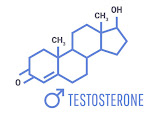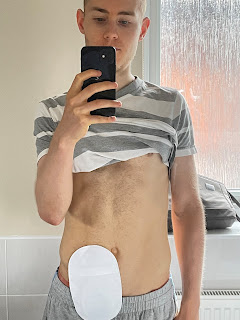Let's Talk About Sex... Hormones!
Yep... I'm going there.
Why? Because it's such an important topic that is usually missed, forgotten or quietly ignored when we discuss eating disorders and how they can affect our bodies; especially with predominantly (cisgender) men who have eating disorders.
Being a cisgender man with an eating disorder, this is something that was missed, time and time again, and has had huge effects on my life and - potentially - my future.
When I filled in my first questionnaire about my eating disorder for my GP, one of the questions was "Women only: Have you stopped having periods". Of course I skipped over that question, it didn't apply to me so obviously issues like that wouldn't affect men, right?
Wrong.
Firstly, I want to point out that most people who mensurate will not lose their periods because of their eating disorder, and I don't think it should be used as a criteria to allocate treatment or who is "worse", as eating disorders affect everyone in vastly different ways.
However, where was the question for people like me? Someone who doesn't menstruate but should naturally produce testosterone in order to develop as a man? The simple answer is that it didn't exist, it's not mentioned anywhere. But that doesn't mean that it doesn't affect us.
The upshot is that I am now permanently stuck somewhere between a 12-15 year old's body (yep, turns out an endocrinologist can work that out by manhandling your bollocks and using something that looks like a morbid necklace).
Loss of menstruation or loss of testosterone is NOT necessarily a marker of eating disorder severity
It's yet another legacy aspect rooted in weight stigma and bias, but even for those who are underweight, they may still not lose their hormones. Bodies are weird and wonderful things and there is never a one-size-fits all.
But for those who do lose their hormones, it can have serious, life changing and - potentially - life limiting effects, such as:
- Osteoporosis
- Frailty in older age
- Infertility
- Lack of physical development
- Stunted growth
- Liver and heart complications
- Struggle to gain muscle mass and conditioning (which can be a vital part of recovery for some)
- Loss of my morning erections. Yep, it might be a "taboo" subject, but it's a NORMAL THING. If you stop having them, it could be a sign.
- Even more taboo... yep masturbation. My body stopped producing seamen. You might laugh reading this, think I'm oversharing. But I wish I'd known it was a sign something was really wrong.
- For teenagers, stunted growth/development.
- Tiredness, agitation, and feeling generally unwell.
- Unable to gain muscle despite trying.




Interesting blog post, thank you for (over)sharing :-) I don’t have the misfortune of an eating disorder per se but have struggled for decades with mental illness. “Hormones” has become my latest personal learning journey. A Crisis Team psychiatrist casually mentioned that peri-menopause could be a trigger for my sudden delve into darkness after several years of remission. It wasn’t considered again and I was laughed at (politely of course) by several health practitioners, from nurses to psychs, in the following months and told I was too young & that hormones wouldn’t have caused such a catastrophic breakdown (they absolutely can, and quite frequently do).
ReplyDelete18 months on, and guess what?! Hormones, due to peri-menopause, now being considered as no.1 contributing factor to my mental health breakdown! So yes, I can definitely see why the question about periods should be redefined when accessing eating disorder services/diagnosis, and their presence, or absence, should definitely NOT, (although I know they are), be used as any type of defining criteria for diagnosis/severity/support services, or what not. You have definitely highlighted an issue here